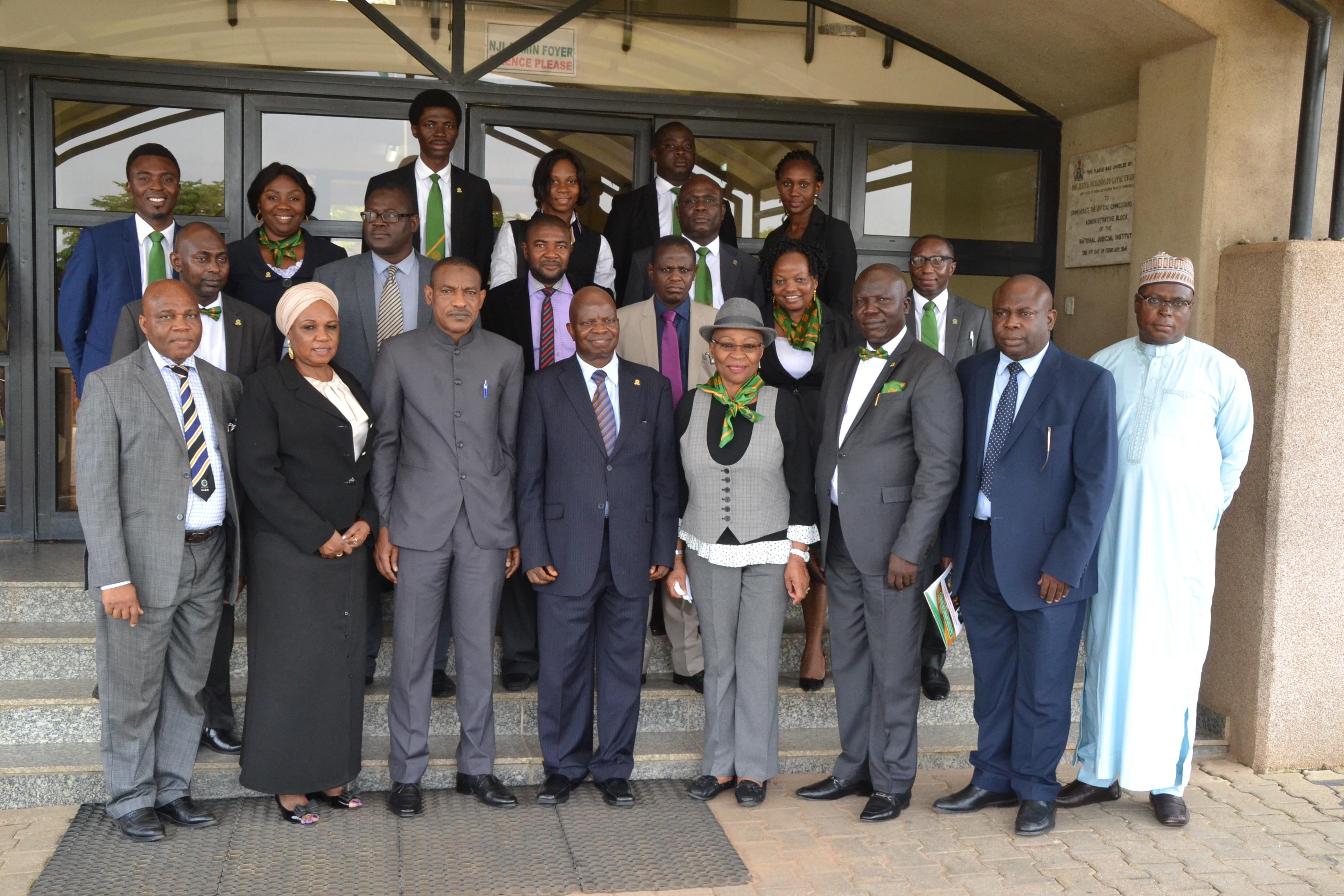Economy
Bankers, Judges Alert Nigerians on Crypto Currencies’ Risks

By Modupe Gbadeyanka
Nigerians have been warned by bankers and judges to be wary of risks involved in transacting their businesses with virtual currencies like bitcoins and others.
Speaking in Abuja on Wednesday at a seminar organised by Chartered Institute of Bankers of Nigeria (CIBN), the Chief Justice of Nigeria (CJN), Justice Walter Onnoghen, said efforts must be made to protect customers in the banking sector.
At the event tagged ‘17th National Seminar on Banking and Allied Matters for Judges,’ the CJN, represented by a Justice of the Supreme Court, Justice Mahmud Muhammad, said the judiciary will continue to provide support for the banking industry.
He said the programme, which focused on the ‘Emergence of New Frontiers in Banking and its Legal Implications,’ came at the right time.
Mr Onnoghen stressed that the judiciary has a huge part to play in the protection of depositors’ funds and warned members of the judiciary not to truncate the present judicial reforms with technicalities.
The CJN said Nigerians should just be careful of how they are exposed to crypto currencies, which seem to be gaining ground by the day despite warnings.
However, he assured that the judiciary will ensure it plays its vital role in the prompt, speedy and just dispensation of cases to protect depositors’ funds.
On his part, President of CIBN, Professor Segun Ajibola, admitted that virtual currencies have altered the traditional form of banking system in Nigeria, but emphasised that efforts must be made to protest citizens’ funds.
He said efforts are being made to study the new trend with a view to finding ways to minimise the risks.
Prof Ajibola noted that, “One of the side effects of the disruptive technology, artificial intelligence and other new tools is the use of the same technology to undermine the control systems in banks and other financial institutions.
“Unfortunately, fraudsters are usually a step ahead of operators, and operators are usually a step ahead of regulators. This explains why policies and regulations aimed at fighting crimes, albeit cybercrimes, are more reactive than being pro-active.
“We need the judiciary to improve on the speed at which cybercrimes are tried and dispensed with. We need the judiciary to assist in strengthening the statutory framework for fighting cybercrimes in this country.”
He promised that bankers will continue to work closely with the judiciary so as to tackle the issues head-on.
Also at the seminar, other speakers called on the government, especially the National Assembly, to closely look into crypto currencies. They said for now, there is no legal backing for the use of virtual currencies in the country.
A cryptocurrency is an encrypted decentralized digital currency transferred between peers and confirmed in a public ledger via a process known as mining. It is also a digital or virtual currency that uses cryptography for security.
A cryptocurrency is difficult to counterfeit because of this security feature.
A defining feature of a cryptocurrency, and arguably its most endearing allure, is its organic nature; it is not issued by any central authority, rendering it theoretically immune to government interference or manipulation.
Business Post recalls that at a Workshop for Financial Correspondents in December 2016 in Kaduna, Managing Director of Nigeria Deposit Insurance Commission (NDIC), Mr Umaru Ibrahim, disclosed that his commission and the Central Bank of Nigeria (CBN) had set up a committee to look into the trending ‘bitcoin’ scheme.
“On our part, we have constituted a committee together with the central bank to have an in debt study of this phenomenal bitcoin.
“We will look at its advantages and disadvantages, what it means for the payment system and what it means for safety and security of customers.
“We will also look at what it means for money laundering, anti-corruption, crime and measurement of money /near money instrument for the economy.
“But we need a lot of education to do this and I’m calling on you (media) to educate yourselves about all of this so you can educate the public,” Mr Ibrahim had said at the event themed ‘Economic Recession and the Nigerians Banking Sector: Opportunities, Challenges and the way Forward.’
In January 2017, the Securities and Exchange Commission (SEC), in a statement posted on its website, warned Nigerian investors to be very careful of advertisements encouraging them to invest in cryptocurrencies such as Swisscoin, OneCoin, Bitcoin and such other virtual or digital currencies.
The capital market regulator had said members of the public must “exercise extreme caution with regard to digital (crypto currencies) as a vehicle of investments,” noting that “this warning is in consonance with similar warnings issued by capital market regulators and Central Banks across the world over the past few years.”
SEC had said it “wishes to alert the public that none of the persons, companies or entities promoting cryptocurrencies has been recognized or authorized by it or by other regulatory agencies in Nigeria to receive deposits from the public or to provide any investment or other financial services in or from Nigeria.
“The public should also be aware that any investment opportunities promoted by these persons, companies or entities are likely to be of a risky nature with a high risk of loss of money, whilst others may be outright fraudulent pyramid schemes.”
But at crypto currency conference held in Lagos last month tagged ‘Learning to Glow with the Flow,’ Deputy Director/Head, Payments System Policy and Oversight at the CBN, Mr Musa Jimoh, disclosed that the apex bank had commenced arrangement to introduce a digital currency in the country a move to key into the global adoption of crypto currency initiative.
Mr Jimoh was quoted to have said at the event that CBN cannot stop the tide of waves generated by the blockchain technology and its derivatives.
“Currently, we have taken measures to create four departments in the institution that are looking forward to harmonise the white paper on Crypto currency,” he had said at the event.
Also at the event, President of Information Security Society of Nigeria (ISSAN), Dr David Isiawe, had said, “The reality that is before us today, particularly in Nigeria, is that the Distributed Ledger Technology (DLT), blockchain and Crypto currency are facts that we must face, whether we like it or not. We cannot wish this reality away.
“It is made worse when we realise that we are still grappling with current challenges of e-commerce and other electronic payment systems but technology development and advancements are not waiting.
“The impact of the emergence of blockchain and Crypto currency will be felt in the nation just as in the global community.
“Nigerian must be proactive rather than reactive by considering how these technologies would affect and influence our lifestyles and business operations and channel, and thus fashion our rules of engagement for their adoption.”
However, Mr Isiawe also admonished prospective investors to be careful investing in crypto currencies, as every investment has its share of risks.
This month, at the 12th Abuja International Trade Fair, Managing Director of the Nigeria Deposit Insurance Corporation (NDIC), Mr Umaru Ibrahim, warned Nigerians to be very careful of how they embrace digital currencies, especially bitcoins, emphasising that they had not yet be certified okay by the necessary regulatory bodies in the country.
He admitted that in other climes, they have been fully embraced, but warned that anyone in Nigeria involved in the trade do so at their own risk as such currencies were not insured by the NDIC.
“In view of the growing popularity which the phenomenon is gaining in Nigeria, it has become important to state that digital currencies are not authorised by the Central Bank of Nigeria, and they are not insured by NDIC,” he had warned earlier this month.

Economy
Grey to Cut Cross-Border Payment Costs with New USD Offering

By Adedapo Adesanya
A cross-border payments solutions company, Grey has expanded its business banking platform to include US Dollar corporate accounts, bulk international payments, and USDC stablecoin support, all integrated into a single system.
The company is positioning itself as a low-cost, faster alternative to traditional international banking, particularly for businesses in emerging markets as it enables companies to open US Dollar accounts, receive global payments, and send payouts to 170+ countries, including bulk transfers, within minutes.
Grey aims to solve common cross-border payment challenges, particularly the high transfer costs that often range between 6 and 7 per cent of transaction value, prolonged settlement cycles that can stretch across several days, and the limited access many businesses face when trying to open and operate foreign currency accounts. In addition, companies frequently contend with hidden intermediary fees and poor foreign exchange transparency, both of which undermine cost predictability and effective cash flow management.
By integrating USD business accounts and USDC stablecoin functionality into its platform, Grey enhances its value proposition around faster settlement, clearer pricing structures, improved cost efficiency, and broader global accessibility. The expanded capabilities enable businesses to manage international transactions with greater speed, transparency, and operational control.
“Businesses may operate without borders today, but access to reliable global banking remains uneven, particularly for companies in high-growth markets,” said Mr Idorenyin Obong, Co-founder and Chief Executive Officer of Grey. “We’re closing that gap and enabling businesses to move money faster, with greater transparency and control, wherever their clients or partners are based.”
“When payments are delayed, or costs are unpredictable, growth stalls,” added Mr Joseph Femi Aghedo, Chief Operating Officer and Co-founder of Grey. “Grey eliminates those friction points, giving businesses a faster, simpler way to manage payroll, supplier payments, and partner payouts across borders. Adding USD and stablecoin capabilities makes these benefits accessible to even more customers.”
Established in Africa in 2020, Grey has a presence in key markets, including the United States, the United Kingdom, and Europe, and has recently expanded its services and operations into Latin America and Southeast Asia.
Since its inception, the company has consistently enhanced its services to empower digital nomads worldwide, regardless of location. Grey’s offerings include multi-currency accounts, low-cost international money transfers, a virtual USD card, expense management tools, and robust security measures.
Economy
Quidax, Lisk to Unlock Stablecoins, On-chain Financial Opportunities

By Aduragbemi Omiyale
A partnership designed to expand access to stablecoins and on-chain financial opportunities for everyday users and businesses has been entered into between Quidax and Lisk.
The partnership provides a critical gateway for the developer community, as builders on the Lisk network can now leverage Quidax’s robust digital asset infrastructure to access stablecoins and local currencies at competitive rates.
This institutional-grade infrastructure is designed to power “future-forward” financial products, ranging from neobanks and cross-border payment platforms to regional exchanges and global fintech solutions. It will also allow Quidax customers to trade and move value seamlessly using USDT, USDC, LSK, and Ether (ETH) on the Lisk network.
The collaboration will also accelerate the adoption of Web3 solutions that solve real-world financial challenges for millions of customers across Africa by combining Quidax’s deep local liquidity and compliant framework with Lisk’s scalable L2 technology.
In 2024, Quidax became the first crypto exchange to receive a provisional operating license from Nigeria’s Securities and Exchange Commission (SEC).
“The partnership with Lisk enables us to extend our platform to serve more people and cater to the increasing demand from products and services that want to integrate our stablecoin and digital assets product to build products across Africa,” the Chief Infrastructure Officer at Quidax, Mr Morris Ebieroma, said.
Also commenting, the Ecosystem Lead for Africa at Lisk, Ms Chidubem Emelumadu, said, “Africa represents one of the most critical frontiers for blockchain innovation, where the demand for reliable and inclusive financial tools is urgent.
“Our partnership with Quidax expands access to stablecoins and on-chain financial opportunities for everyday users and businesses. At the same time, it gives founders building on Lisk the critical infrastructure they need to create solutions that can scale meaningfully across the continent,” she added.
Economy
Customs Urges Freight Forwarders to Adopt Automated Licence, Permit System

By Adedapo Adesanya
The Nigeria Customs Service (NCS) has urged freight forwarders to adopt its automated Licence and Permits Processing system to reduce the cost of doing business.
This advice was given by the Assistant Comptroller-General of Customs, Mr Muhammed Babadede, during a stakeholders’ engagement on automation held in Lagos on Monday.
He noted that the reform responds to longstanding demands for faster, more transparent and simpler procedures for industry stakeholders, disclosing that Comptroller-General of Customs, Mr Bashir Adeniyi, has approved the full automation of the service’s licences and permits processes.
“For years, stakeholders dealt with paperwork, long queues and uncertainty from manual processing. Those days are coming to an end.
“This sensitisation is across all zones. The goal is to ensure stakeholders understand the automated system before implementation,” Mr Babadede said.
He said automation would enable applications and renewals from offices or mobile phones, eliminating visits to customs formations, assuring stakeholders of a fair and consistent process, and reducing errors associated with manual documentation.
He said automation would improve record-keeping, supervision and service delivery without increasing pressure on officers.
The Deputy Comptroller-General, Tariff and Trade, CK Naigwan, also represented by Mr Babadede, reiterated management’s commitment to seamless implementation.
Meanwhile, the Comptroller of Customs for Licence and Permit Unit, Mrs Ngozika Anozie, praised the Comptroller-General for driving innovation within the Service, saying the automation aligns Customs procedures with global best practice and strengthens institutional efficiency.
According to her, the reform reflects the three-point agenda of the Chairman of the World Customs Organisation, Mr Adeniyi, centred on consolidation, collaboration and innovation.
She said the system would enhance the ease of doing business in the maritime sector and boost national revenue generation.
“Automation will cut business costs and reduce travel risks for stakeholders
“They will no longer travel repeatedly to Abuja, paying for transport, hotels and feeding to process licences and permits,” she said, adding that the platform would automatically reject fake documents and accept genuine submissions, curbing fraudulent practices.
“The CGC is determined to sanitise the system, and we are committed to achieving that objective,” Mrs Anozie said.
On his part, the Assistant Superintendent of Customs, Mr Ibrahim Usman, said the Licence and Permit Unit operates under the Tariff and Trade Department.
He explained that the unit ensures proper issuance of licences and permits and compliance with import regulations.
Mr Usman said all licences and permits expire on December 31 of their issuance year.
He added that the portal would become fully operational after nationwide sensitisation, with stakeholders duly informed.
Customs Area Controller, Tincan Island Command, Mr Frank Onyeka, thanked stakeholders for their continued support.
He urged them to take the exercise seriously to achieve seamless processing across Customs operations.
Stakeholders raised concerns about online payment integration and potential technical disruptions.
Officials addressed the questions and pledged continued engagement to ensure smooth implementation nationwide.
-

 Feature/OPED6 years ago
Feature/OPED6 years agoDavos was Different this year
-
Travel/Tourism10 years ago
Lagos Seals Western Lodge Hotel In Ikorodu
-

 Showbiz3 years ago
Showbiz3 years agoEstranged Lover Releases Videos of Empress Njamah Bathing
-

 Banking8 years ago
Banking8 years agoSort Codes of GTBank Branches in Nigeria
-

 Economy3 years ago
Economy3 years agoSubsidy Removal: CNG at N130 Per Litre Cheaper Than Petrol—IPMAN
-

 Banking3 years ago
Banking3 years agoSort Codes of UBA Branches in Nigeria
-

 Banking3 years ago
Banking3 years agoFirst Bank Announces Planned Downtime
-

 Sports3 years ago
Sports3 years agoHighest Paid Nigerian Footballer – How Much Do Nigerian Footballers Earn






















1 Comment